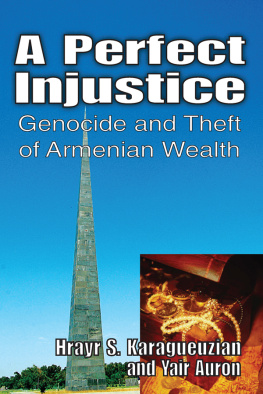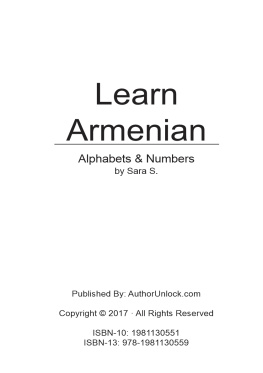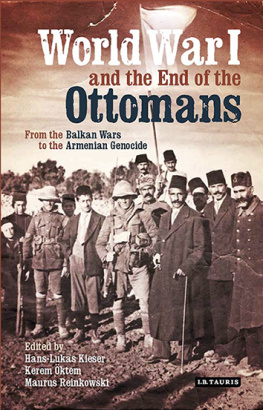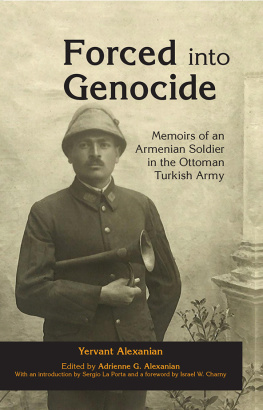First published 2009 by Transaction Publishers
Published 2017 by Routledge
2 Park Square, Milton Park, Abingdon, Oxon OX14 4RN
711 Third Avenue, New York, NY 10017, USA
Routledge is an imprint of the Taylor & Francis Group, an informa business
Copyright 2009 by Taylor & Francis.
All rights reserved. No part of this book may be reprinted or reproduced or utilised in any form or by any electronic, mechanical, or other means, now known or hereafter invented, including photocopying and recording, or in any information storage or retrieval system, without permission in writing from the publishers.
Notice:
Product or corporate names may be trademarks or registered trademarks, and are used only for identification and explanation without intent to infringe.
Library of Congress Catalog Number: 2009018496
Library of Congress Cataloging-in-Publication Data
Karagueuzian, Hrayr S.
A perfect injustice : genocide and theft of Armenian wealth / Hrayr S.
Karagueuzian and Yair Auron.
p. cm.
Includes bibliographical references and index.
ISBN 9781412810012 (alk. paper)
1. Armenian massacres, 1915-1923--Economic aspects. 2. Armenians
-Turkey--Claims. 3. Life insurance claims. 4. Life insurance policies. I.
Auron, Yair. II. Title.
DS195.5.K298 2009
956.620154--dc22
2009018496
ISBN 13: 978-1-4128-1001-2 (hbk)
In November 1916, Aaron Aaronsohn, the leader of the Nili Group, sent two reports to the British War Office. The Nili Group, a pro-British Jewish spy organization in Palestine composed mostly of young, locally born children of Jewish colonists, which numbered no more than forty active members at any time, operated during the First World War. The group identified empathetically with the then ongoing tragedy of the Armenians, a calamity that influenced their activities. The two documents, both written by Aaronsohn himself, dealt with the massacres of Armenians by the Turks.1 Aaronsohns reports, which were transmitted by the British War Office to the Foreign Office and to the British intelligence services, were also sent to the British Military Command in Cairo. They were highly regarded by the British authorities.
According to his diary, Aaronsohn had been asked to write a report to the War Office about the acts of brutality against the Armenians.2 He gave the first report the title Pro-Armenia, which testifies to its character. It is not only a comprehensive intelligence report of twenty pages, which presents facts and details, but also, and perhaps primarily, a personal statement, humane and moral, from the vantage point of a Jewish observer. Aaronsohns spirit and personality infuse the report.
The second report dealt mainly with two topics: the severe damage to the faltering Ottoman Empire following the Armenian massacre, and the theft of Armenian property by the Turks. The Turks were not well versed in the economic or agriculture management, or in organizing the countrys civil service without the Armenians, who had provided the brains and hands for the Turkish government. There was also the organized theft of Armenian property and its distribution to influential Ittihadist Turkish leaders without any compensation to the Armenians. This was termed internal colonization. According to Aaronsohn, this theft was implemented by the Turks but had first been proposed by the Germans, and it replicated the latters recent internal colonization in Posnan, which was intended to block the Polish advance. Aaronsohn remarks that information about the Turkish actions initially reached the outside world despite censorship of the German press by the German and Turkish authorities, but was later successfully blocked.
Aaronsohn is extremely critical of the Germans, and his comments on the German mentality arouse wonder today: The Armenian question was a safe question to tackle with official Germans and the writer failed on no occasion to start on it, so he had the opportunity to have the minds of hundred stories [sic] proving the cruelty of the Turks, the useless and shameless barbarity, and so on.3 Aaronsohn was also shocked by the Germans exploitation of the Armenians distress:
Every clean-minded man would shrink at the idea of making any profit from a situation like that the Armenians were in. Not so the Germans. They made bargains. It would be unfair to say they robbed the Armenians, but these poor souls being compelled to consideration the Germans took advantage of conditions and bought carpets, jewelry, trinkets at a tenth part of their real value. Germany will be the richest country in carpets.
The wholesale massacre of the Jews ordered by the Roman general Titus is the only record in history to be paralleled with the wholesale massacre of the Armenians. And now just as then, here just like there, it was a government scheme.
The full and entire responsibility of the Turkish Government whatever and whoever it be in these massacres makes no doubt. The massacres were planned out by the Central Government in Constantinople and it is only for that reason that it was possible to carry them out on such a large scale, with such simultaneousness, perseverance and method.
Even in these days of fierce battles the tremendous numbers of innocent people killed and destroyed call out attention. Morally and economically the Armenian people in Turkey is totally ruined although a few private fortunes were, by clean or unclean ways, spared destruction. From one of the most thrifty and most industrious elements of the Turkish Empire, if not the most thrifty and most industrious mind it is a Jew that gives this certificate the Armenian race is now a race of starving downtrodden beggars, the purity of its family life destroyed, its manhood killed, its children, boys and girls, enslaved in the Turkish private homes for vice and debauchery, that is to what the Armenian race in Turkey has come to.4
Aaronsohn sees imperialistic political reasons for the German approach to the Armenian question. The Germans thought that if it was worthwhile to attempt colonization of areas in East Africa and other places, it was criminal to ignore Anatolia, which was so blessed in its geography, climate, agriculture, and natural resources. Seventy-five years earlier, Helmuth von Moltke (chief of the Prussian, and then German, general staff at the end of the nineteenth century) had pointed out that this land was desirable for future colonization by Germans, and now more and more Germans were pointing this out. In his report Aaronsohn sums up:
Looking at it from this light, would any one who knows something of Germans and the long and sometimes crooked way they can go for the realization of their high ambitions, which are in fact nothing less than divine missions, would any such man hesitate to say that wiping out of those countries the thriftiest element there was, could not have displeased, not even hurt German politics? And would not the Germans themselves, when better fed and in more boisterous spirits than today, said: a crime? That is arguable, but good, farsighted German realpolitik, is it not?
The Armenian massacres are the carefully planned acts of the Turks, and the German will certainly be made forever to share the odium of these acts.5
Frank Chalk and Kurt Jonassohn, in their classic







